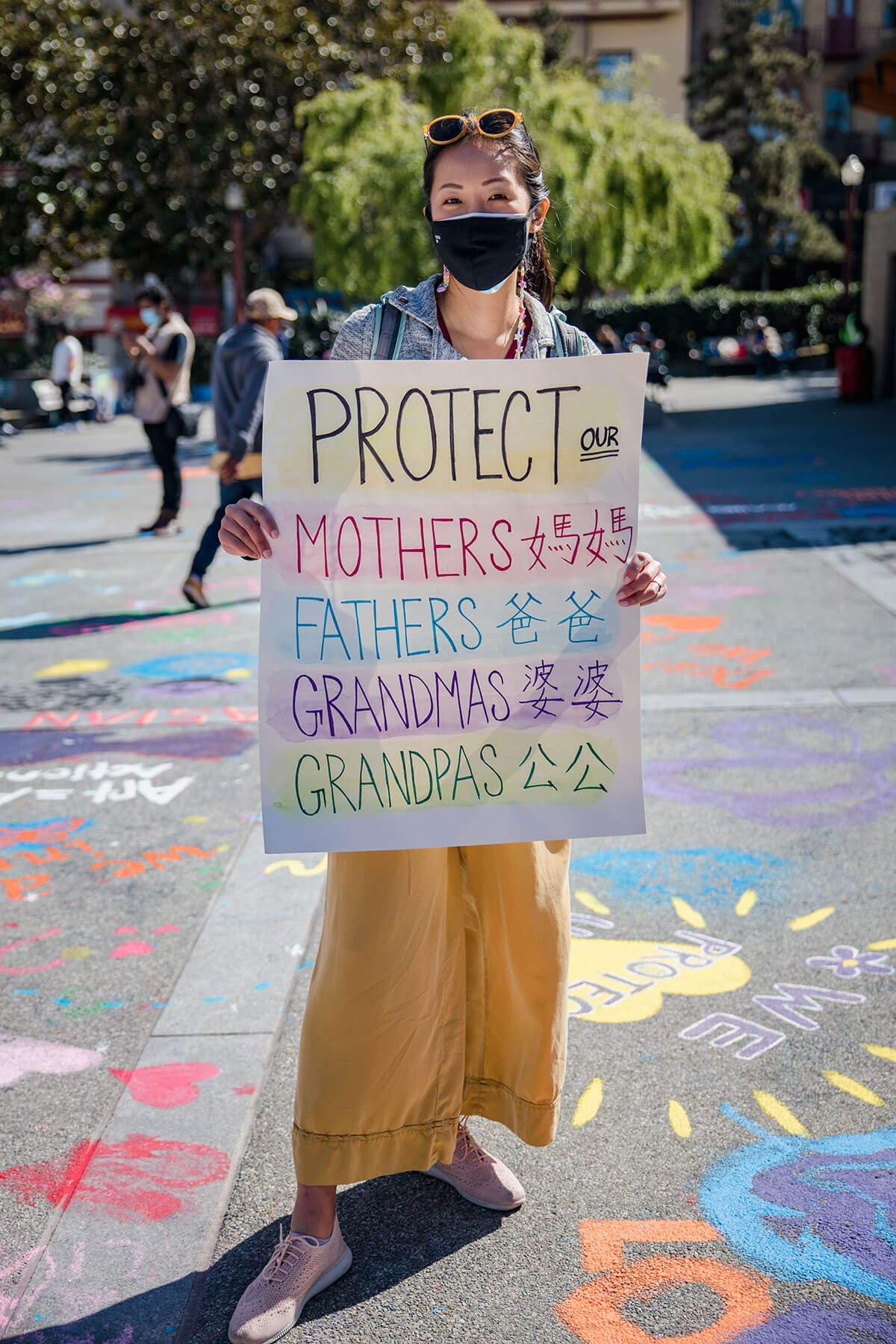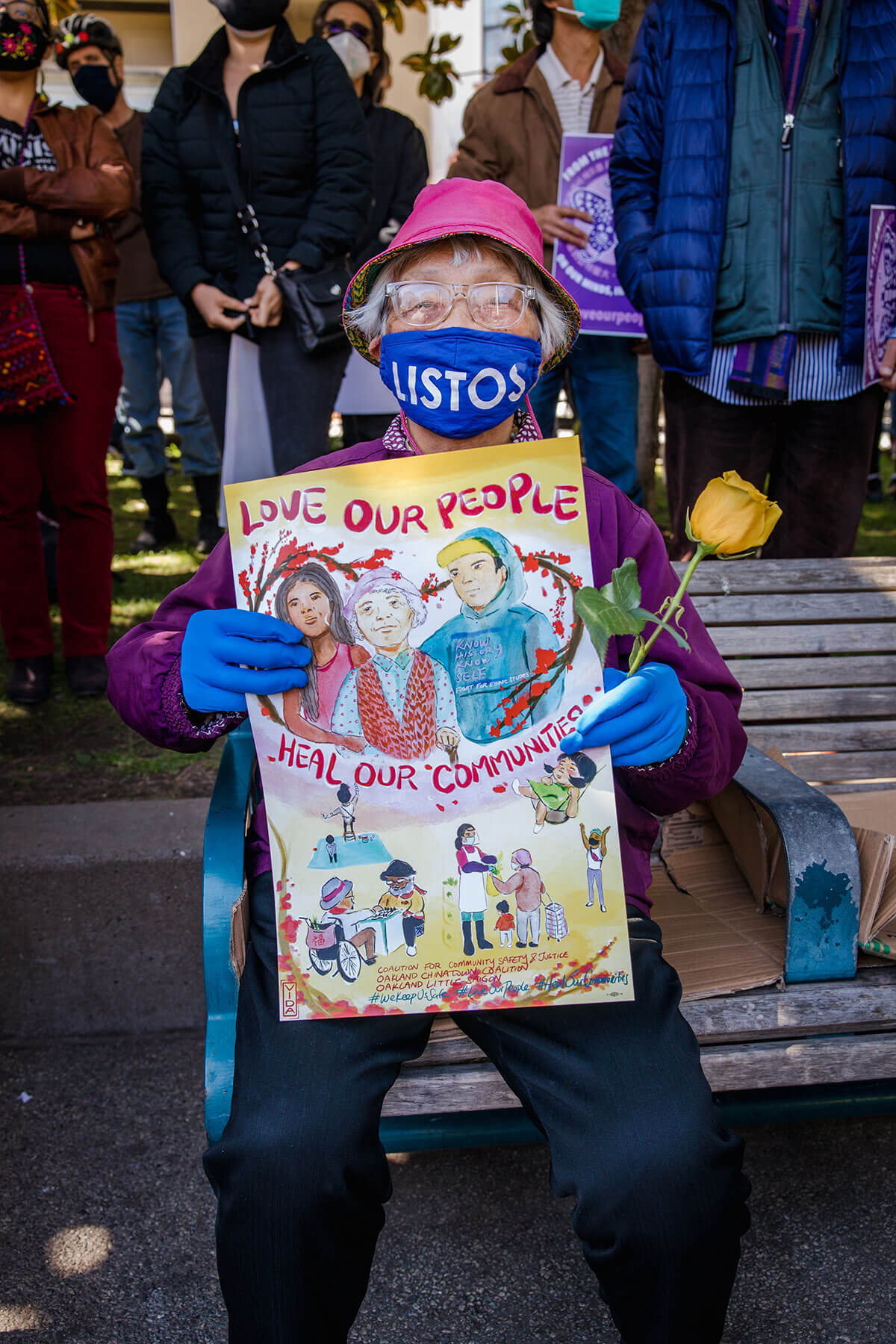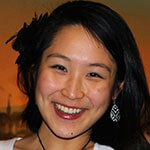
to be fishers of men
they left their homes,
the tombs to be swept,
the nets to be cast
and followed him
he who now weeps
for instead of fishers,
we have killers of men,
women, and children
and when he is raised
who will sweep the tombs of those saints?
• • •

This year, the president of United Chinese Americans reminded me that Easter happened to coincide with the Tomb-Sweeping Festival (Qingming Jie 清明节), also known as Hansik among those of Korean descent. Since then, I’ve been wrestling with the question of what the resurrection may mean for Christians of Asian descent and our broader communities amidst the ongoing acts of hate toward us during the pandemic. I have struggled with the violence against BIPOCs in the U.S. and the fact that the murderer in the Atlanta shooting was not just a white male, but also a practicing Southern Baptist.
Initially, I felt only grief. One evening, when I closed my eyes in meditation, I saw Jesus, mourning the path of his “disciples” today. Words from my heart poured out into the poem above, which recalls how Jesus’ disciples chose to follow him (cf. Matthew 4:20) and points to how far so-called Christians have strayed from Christ’s love today.
In our grief and mourning, let us return to sweep the tombs, just as Mary Magdalene did on the day of Jesus’ resurrection. Frequently when the passage of John 20:1-18 is preached, Mary Magdalene becomes a central character whose role serves as evidence for the gospel’s authenticity and gender equity, relative to other documents of its time. However, Mary’s role is far more than that. As the first witness of the resurrection, she fully laments the death of Christ, clings onto him as a source of hope, and serves as a model for his disciples, including BIPOC followers today.
From the very start of the passage, Mary grieves the state-sanctioned murder of Jesus. She rises before dawn to tend to her beloved healer and teacher’s body, even after the apostles have scattered in fear of persecution. One can picture her, moving quickly and quietly to escape any notice, carrying an abundance of spices and mentally planning how she will embalm the corpse. Her thoughts are disjointed, her entire body shaking from the trauma of witnessing Jesus’ gruesome death on the cross. She tries to focus on the task at hand: caring for her Lord and honoring his memory.
Approaching the tomb, she can hardly believe her eyes. The stone sealing the tomb has been removed — someone must have robbed and desecrated the tomb, Roman soldiers spiteful against the "king of the Jews,” most likely, or perhaps the Pharisees and Sadducees whom Jesus had sassed. The abhorrence and violence that the apostles had fled, and which Mary herself feared as she came to the tomb, must have claimed the last remnant of her Rabbi.
Running to Simon Peter and the other disciple, she speaks in horror, not only at the hateful act against Jesus even in death, but also the threat it symbolized to the disciples still alive. “They have taken the Lord out of the tomb, and we do not know where they have laid him” (John 20:2, NRSV).
After Peter and the other disciple found the linen cloth and examined the open tomb for evidence of what happened, Mary does not return home as they do. She stands outside and weeps. When angels appear and ask her why, she says again, “They have taken away my Lord, and I do not know where they have laid him” (John 20:13, NRSV).
Mary acts and speaks according to her mourning. And when Jesus appears, she recognizes him as soon as he says her name. Amidst the inexhaustible mystery of Jesus’ resurrection account, one thing is clear: Jesus makes himself known to Mary by saying one word, a tender greeting that acknowledges her full existence, reminds her of purpose and hope, even in the midst of horrible persecution.
Mary’s testimony resonates deeply with that of Asian American immigrants, many of whom have lost loved ones to war and violent sociopolitical purges abroad, as well as hate crimes in the U.S. In fact, the experience of finding a tomb emptied, dug up or robbed is far from unique. My father has had a glimpse of Mary Magdalene’s horror, too.

My grandfather was a businessman who was persecuted and died just prior to the Chinese Cultural Revolution, leaving my dad, who was 6 at the time, fatherless. The stories my dad told me at bedtime as I grew up were filled with his boyhood antics: digging up toads in the yard of his apartment or playing with bucktoothed or snot-dripping kids in the neighborhood. Amidst his accounts of hilarious exploits, however, there was a profound underlying sadness.
Only much later, after I had grown into adulthood, did he begin to share his most traumatic memories. Of them, he said that one still made him tremble to recall: some time after my grandfather’s death, my grandma and dad heard reports of the defilement and robbing of graveyards throughout Shanghai. My dad vividly recalls rushing with my grandmother to my grandfather’s grave, only to find that it had been dug up, with just a few scant bones scattered and mixed with those of neighboring bodies.
“They,” the mindless vandals produced by the political movement at the time, had taken away his father, and he would never know “where they had laid him.” The grief upon grief, the horror upon horror he felt clinging onto his mother’s hand and weeping as he returned home would stay with him for the next six decades.
Later, when I was 8 years old, I would witness my father’s expression of grief firsthand: weeping by the kitchen sink in our suburban American home, one hand shaking as he held the phone to his ear, the other covering his eyes as tears dripped down his face. His mother, the only grandparent I had ever met during a visit to Shanghai, had just died. She lay across the world, and it was too late to say goodbye.
In my father’s mourning, I served as witness. As his child, I called him “Baba,” reminding him of who he was to me, of his purpose and hope in the midst of unshakeable melancholy.
Here, we of Asian descent are thousands of miles away from our ancestors’ graves, far removed from our generational histories. Every day we spend working, loving, simply living here, we forge new narratives in this country. This country, marked and sustained by stolen land from indigenous peoples and enslaved labor of Black people, among others. This country, offering promises of prosperity and hope, without mentioning whose blood is the cost. This country, where we may desire harmony and stability, where we weave threads of stories together with the hope that our children will inherit them and remember. This country, where justice lies at the end of an arc that can feel far too long — and yet, this country is the one we have chosen to call our home.
For immigrants of the Chinese and Korean diasporas who now live in this country, Qingming Festival and Hansik are thus symbolic, a day we remember our ancestors in our hearts and minds, rather than in the place where they are buried. We still strive to honor our identities, our embodied histories. But rather than the soil, we turn to our own bodies and souls as memorials to the dead.
As for Christians, we follow the example of Jesus, who spoke of his own body as a temple, the Temple, in fact, that would remain when the Jerusalem Temple was destroyed (cf. Matthew 2:19). On Easter, we celebrate how Jesus rose from the grave, leaving not a tomb to be swept, but a Spirit who dwells within his disciples and calls us to embody God’s love, justice, and mercy. We are to honor place, to love those who came before us and those who will come after us, to bring the kin-dom of heaven to earth. As we follow Jesus, we also bring our unique languages and cultures with us, to share bravely as led by the Spirit, as the disciples did on Pentecost (cf. Acts 2:4).
We are to embody a radically expanded love, which is a place unto itself, a home that is chosen and created. And, at the same time, we carry our former homes with us, the memories of our origins. As we love in the context of our collective narratives, we also interrogate them, mourning injustice, grieving loss, learning from the horrors of history and asking God to take the scales from our eyes (cf. Acts 9:18).
Hope cannot be found solely in this world, where cycles of violence repeat themselves, and the idol of a white imperial God-man has brought up killers, not fishers of men. We, as people made in God’s image, are the hope — we create hope by discovering and honoring all aspects of our identities, by showing kindness, justice, and mercy to each other, by seeking out shelter in God’s promises, and by maintaining resilience and courage. In Jesus’ words in the Sermon on the Mount, those who do these things are “blessed” (cf. Matthew 5:1-12, AMP).
And Jesus’ invitation to blessing extends to all. To whoever is reading this: I mourn and hope with you, and I am honored to share this journey with you.

• • •
O Creator God,
You who spoke us into being,
who nurture and protect us as a Heavenly Mother,
who sees each and every one of us,
You called us to follow Your ways, to bring Your kin-dom to earth,
to seek peace that defies the ways of this world.
You know our hearts, our embodied histories and purpose.
You were and are a part of our stories across generations.
You know the whole stories, the traumas, the triumphs, the big and little moments,
the ancestors, the children and grandchildren,
of those killed in the shooting in Atlanta.
You weep for the children whose lives on earth have been claimed by hate
— not only those of Asian descent during this pandemic,
but also the millions of Black, Brown, and indigenous people
who have been exploited, tortured, and murdered,
whose blood are literally calcified into the soil of this country.
You weep with us in deep mourning and melancholy.
You hold these siblings and their loved ones in tender embrace.
And in the midst of our pain, we hold onto the promises of Your justice and Your mercy.
We love you, O God, we hunger and thirst for You.
As Mary Magdalene clung to Jesus, so we desire to cling to you.
And yet, just as she was to let him go and be led by the Spirit,
so we ask that You send Your Spirit of love and justice to us.
Grant us the divine power to stand together in the face of hate —
to embody radical love, to transform cultures of shame and dismantle systems of oppression,
to speak out and stand against white supremacy,
to hold out for justice and practice the patience to withhold “cheap” grace,
to hold onto love for ourselves and our neighbors, just as You love us.
May Your Spirit be with us as we bring your kin-dom to earth.
Amen.

Jennifer Y. Tu (she/her) is a proud second-generation Chinese American, born and raised in New Orleans. She is currently an M.T.S. and M.D. candidate at Duke University. She majored in neurobiology at Harvard College where she pursued dementia research and advocacy. After graduating, she spent a year in Taipei, Taiwan as a Luce Scholar, focusing on dementia caregiver burden, receiving mentorship in geriatrics and psychiatry, and learning Mandarin and Taiwanese. Her interests have led her to the intersections between medicine, religion & spirituality, music, and mental health.